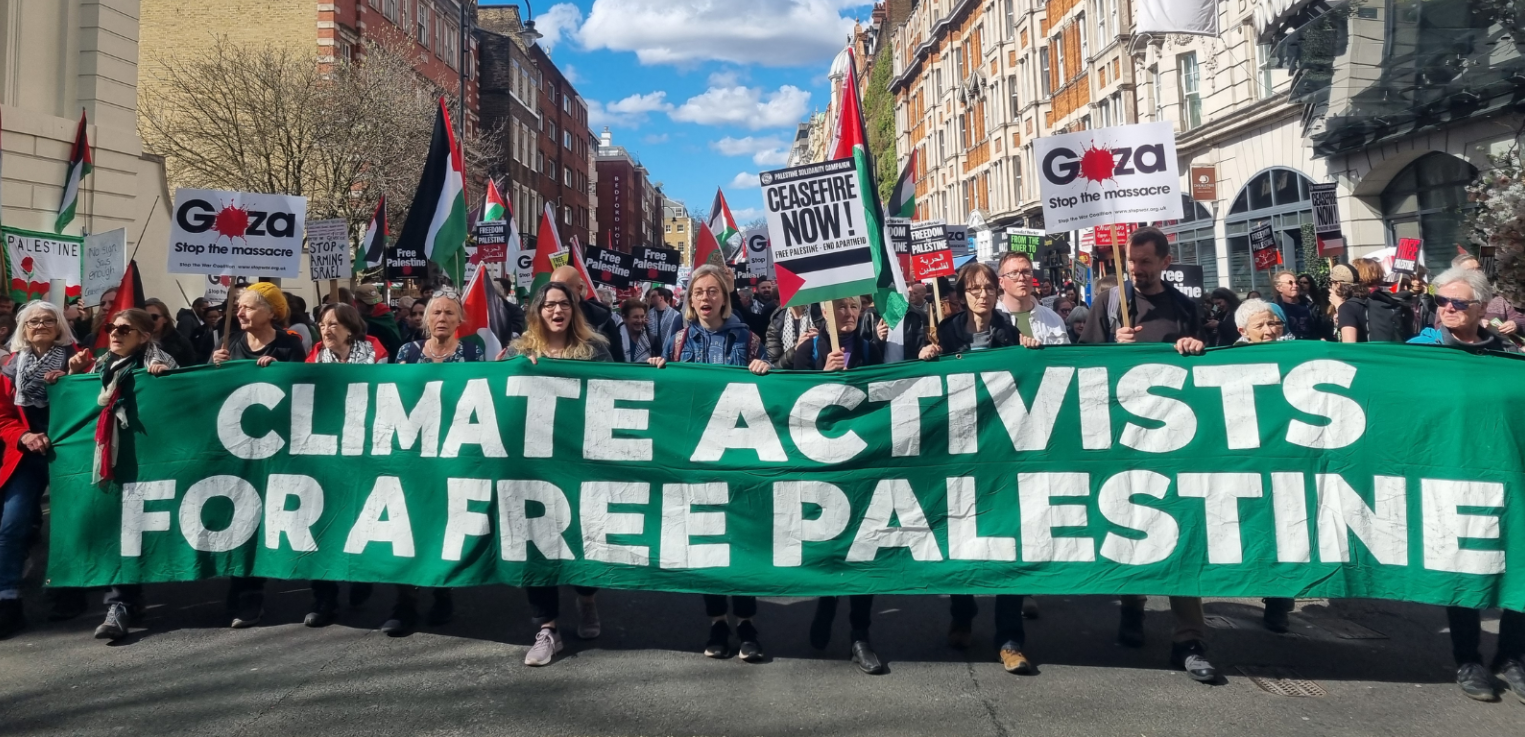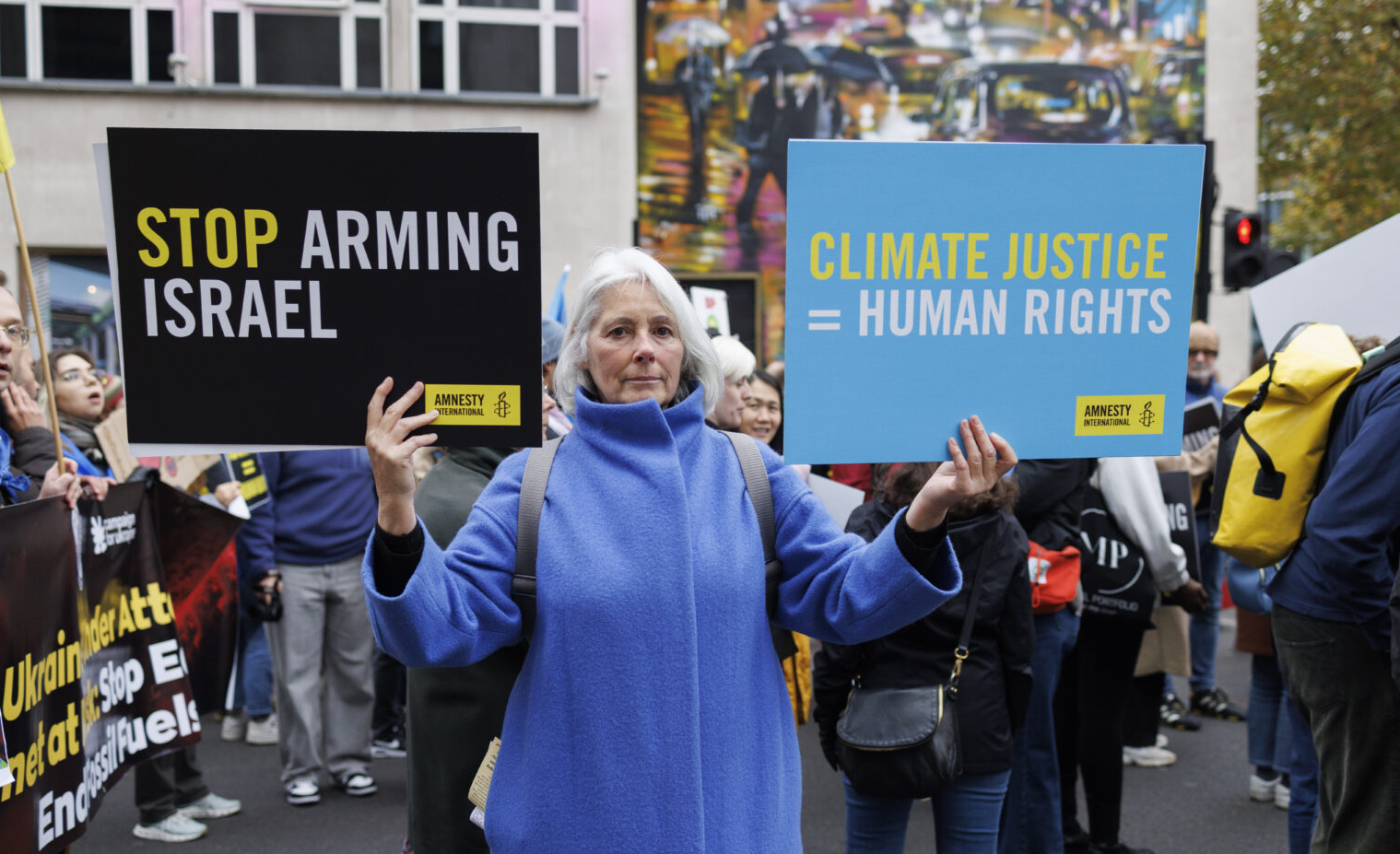
Twelve charities concerned about the environment are the latest targets of a pro-Israel organisation which tries to silence support for Palestinians with threats of legal action. UK Lawyers for Israel (UKLFI) accuses them of acting illegally and has reported them en masse to the Charity Commission.
The story began last November when environmental activists held a protest march in London, timed to coincide with the COP29 climate conference in Azerbaijan.
The twelve charities are said to be members or associates of the Climate Justice Coalition (CJC) which coordinated the event. Dozens of organisations supported it — among them Greenpeace, Amnesty International, Just Stop Oil and War on Want. Demonstrators called on the British government to take stronger action on climate change and also to end “its complicity in Israel’s escalating genocidal violence”.
In a note about the march on its website, CJC said: “The climate crisis and genocide in Gaza are inextricably linked and we must put an end to both. Without human rights, there can be no climate justice.”
According to UKLFI, “This upset climate campaigners who did not agree with CJC’s anti-Israel campaign”. The protest, UKLFI director Caroline Turner said, was “nothing short of antisemitic” because it linked climate change to a “false accusation” of genocide by Israel.
This linkage is at the centre of the tussle between UKLFI and the protesters. UKLFI sees no reason other than antisemitism for bringing Gaza into the climate debate, while CJC and numerous other activists say there’s no way Gaza can be excluded.
Environmental damage
Wars are undoubtedly bad for the environment and Gaza is no exception. Aside from damage to the local environment caused by bombs and tanks, CO2 emissions and other greenhouse gases from the Gaza war are making a significant contribution to global warming.
A study published last year calculated emissions during the first two months of the war as equivalent to 381,000 tonnes of CO2. There are 20 entire countries with lower annual emissions than that.
The researchers’ calculation is almost certainly an underestimate because some factors — such as the effect of fires resulting from explosions — are too difficult to measure. Furthermore, emissions from the war itself are a relatively small part of the problem: the earlier preparations for war and future reconstruction have to be considered too.
Regarding preparations, the carbon cost of Israel’s defensive system along the Gaza border was almost 274,000 tonnes of CO2, the study says, while construction of Hamas’s extensive tunnel system generated about 176,000 tonnes.
By far the biggest contribution to global warming is expected to come from post-war reconstruction, though. Emissions from replacing destroyed buildings in Gaza with something similar will be roughly equivalent to 30 million tonnes of CO2, the study says. That — in a strip of land 40km long and no more than 12km wide — is about the same as the total annual output of New Zealand.
“This research helps us understand the immense magnitude of military emissions — from preparing for war, carrying out war and rebuilding after war,” David Boyd, the UN special rapporteur for human rights and the environment, told the Guardian. “Armed conflict pushes humanity even closer to the precipice of climate catastrophe, and is an idiotic way to spend our shrinking carbon budget.”

Climate justice
In denying the Gaza war’s relevance, UKLFI not only ignores the facts but places itself in opposition to the concept of climate justice — a way of viewing climate change that focuses on the social and political effects: those who cause environmental damage are often not the ones who suffer its consequences.
“Climate justice means finding solutions to the climate crisis that not only reduce emissions or protect the natural world, but that do so in a way which creates a fairer, more just and more equal world in the process,” Friends of the Earth says. “As injustice is a root cause of the climate crisis, so fighting for justice must be at the heart of the solutions.”
A coalition of organisations
The Climate Justice Coalition, as its name indicates, is a network of groups and individuals interested in promoting climate justice. Its website identifies more than 50 organisations as members or affiliates. They include environment and development NGOs, trade unions and grassroots community campaigns, plus several faith groups ranging from Catholics to Quakers.
CJC facilitates networking among members and it coordinates some of their activities. Its website also provides information about specific campaigns by members, including several that UKLFI describes as “anti-Israel”: a “don’t bank on genocide” campaign against Barclays by War on Want, a petition organised by Global Justice Now against arms sales to Israel, and another by Friends of the Earth calling for a ceasefire.
Complaints to the Charity Commission
Making complaints to the Charity Commission is a tactic that UKLFI has often used in the past. The war against climate justice is a new departure but so far it’s following a familiar pattern. UKLFI is a serial complainer to the Charity Commission regarding the many charities it disapproves of.
The commission’s main task is to ensure that charities are properly managed and comply with the law. “Deliberate wrongdoing, illegal activity, criminality and serious abuse,” it says, “will be dealt with rigorously and decisively.” The rules are complicated and in the event of a breach the commission’s usual approach, at least initially, is to try to resolve any problems and bring the charity back into compliance rather than resorting to punitive measures. In a worst-case scenario, though, it can shut the charity down.
The activities of charities must benefit the public in line with their stated charitable purposes. They are allowed to campaign and engage in political activity so long as it is relevant to their charitable purposes and doesn’t become their only activity or the reason for their existence.
One of UKLFI’s favourite tactics is to accuse them of doing things that are not permitted by their statement of charitable objectives. In a complaint against Medical Aid for Palestinians, for example, it argued that “relief of sickness” — one of the charity’s objectives — did not extend to providing “medical care for injuries caused by armed conflict”.
Even if the complaints don’t result in punitive action by the commission, the publicity surrounding them can damage a charity’s reputation and affect its fundraising. The charity is also forced to spend time and effort justifying its activities to the commission.
Accused of lawbreaking
The twelve charities accused of lawbreaking in UKLFI’s latest barrage of complaints are …
- Society of St Columban for Foreign Missions
- Friends of the Earth Charitable Trust
- Global Justice Now
- London Mining Network
- Faith for the Climate
- Platform
- Students Organising for Sustainability
- Climate Outreach and Information Network
- Joint Council for the Welfare of Immigrants
- Migrants Organise
- Racial Justice Network
- Stop Climate Chaos Scotland**
UKLFI says these are all members or associates of the CJC. It alleges they broke the law because “aligning themselves with the CJC and its anti-Israel campaigns was outside their charitable objects”. It says it wrote to them about this in November following the COP29 protest but they all ignored its letters — hence the decision to report them to the Charity Commission.
Interestingly, UKLFI has a charitable arm of its own — UKLFI Charitable Trust — which hosts online webinars promoting hardline Israeli positions. One of its guest speakers was Naomi Khan from Regavim — an extremist pro-settler organisation “dedicated to the protection of Israel’s national lands” (e.g. the West Bank). Regavim minutely monitors construction work by Palestinians and Bedouins then takes court action against any that lacks an Israeli permit. The entire focus of Regavim is “protecting the land of Israel and Israel’s sovereignty, from the most basic unit upwards,” Khan said in her talk for UKLFI.
In another of the charitable trust’s webinars, Orde Kittrie, a law professor from Arizona State University, spoke about the “scurrilous apartheid charge” against Israel. “Unlike South Africa’s apartheid system, the Israeli-Palestinian conflict is not about race,” he said. According to Kittrie, “race” refers only to physical characteristics such as skin colour.
In case you are wondering how talks of this kind comply with the trust’s charitable aims, UKLFI’s answer is that their purpose is “to advance legal education”.
** NOTE: The Charity Commission regulates charities registered in England and Wales and the Scottish Charity Regulator regulates those registered in Scotland. Stop Climate Chaos Scotland is registered with the Scottish regulator. The Society of St Columban is registered with both regulators.
* * *
More articles about UKLFI
From warfare to lawfare: Israel’s other battleground
2 August 2024
Pro-Israel lawyers target London arts venue in move to silence Palestinian voices
31 August 2024
Prominent Jewish peer resigns from pro-Israel activist group
10 September 2024
Cultural genocide: the battle to suppress Palestinian voices
17 September 2024
Pro-Israel campaigners get references to genocide removed from art exhibition
19 September 2024
Harassment claim by pro-Israel lawfare group ‘wholly without merit’
5 December 2024
Pro-Israel lawyers target climate activists over Gaza
10 January 2025
Shush! Don't mention genocide!
1 February 2025
UKLFI complains that talk of genocide is distressing for Israel’s supporters
21 August 2025

 RSS Feed
RSS Feed
